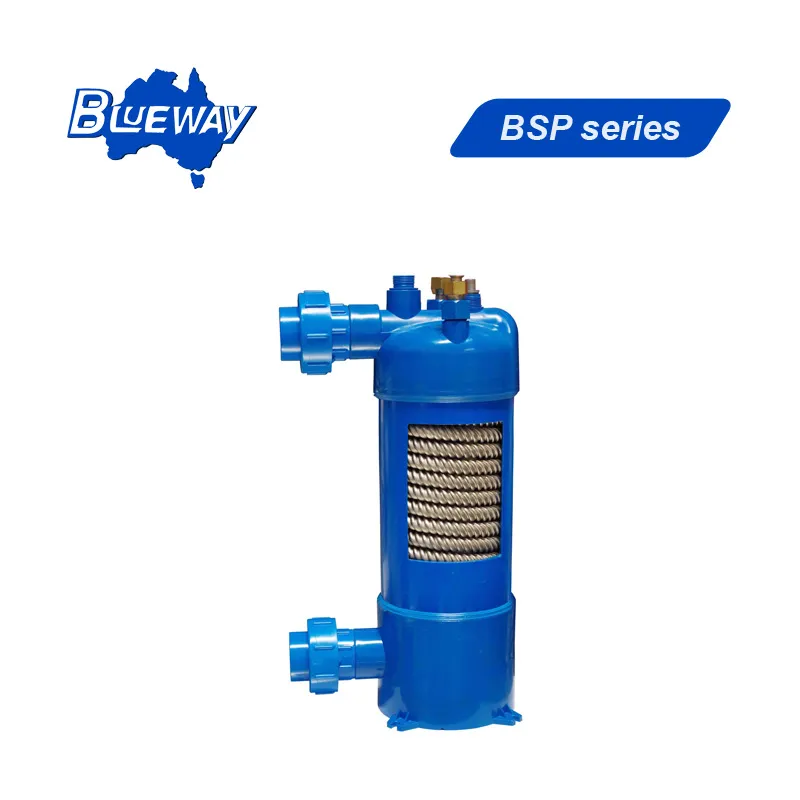The Advantages of Titanium Heat Exchangers: Efficiency Meets Durability
2024-08-04
The Advantages of Titanium Heat Exchangers: Efficiency Meets Durability
In the realm of heat transfer technology, heat exchangers play a crucial role in various industrial and commercial applications. Among the different types available, titanium heat exchangers stand out due to their exceptional durability, efficiency, and resistance to corrosion. In this blog, we’ll explore the key features, benefits, and applications of titanium heat exchangers, and why they are a top choice for demanding environments.
What is a Titanium Heat Exchanger?
A titanium heat exchanger is a specialized device designed to transfer heat between two or more fluids while utilizing titanium as the primary material for its construction. Titanium, known for its remarkable properties, offers several advantages over other materials used in heat exchangers. These units are commonly employed in industries where high performance, corrosion resistance, and longevity are critical.
Key Features of Titanium Heat Exchangers
1. Corrosion Resistance: Titanium is highly resistant to corrosion, particularly in harsh environments such as seawater, acidic or alkaline solutions, and other aggressive media. This property ensures that titanium heat exchangers maintain their integrity and performance over time.
2. High Thermal Efficiency: Titanium heat exchangers are designed to maximize thermal efficiency, enabling effective heat transfer between fluids. This results in optimized energy use and improved system performance.
3. Lightweight Construction: Titanium is known for its high strength-to-weight ratio. Titanium heat exchangers are both strong and lightweight, which can be advantageous in applications where space and weight are a concern.
4. Durability and Longevity: Due to its resistance to corrosion and wear, titanium heat exchangers have a long operational lifespan, reducing the need for frequent replacements and maintenance.
5. High Temperature Tolerance: Titanium can withstand high temperatures without losing its mechanical properties. This makes it suitable for applications involving extreme heat or temperature variations.
6. Low Maintenance: The durability and corrosion resistance of titanium reduce the need for frequent maintenance, resulting in lower overall operational costs and reduced downtime.
Benefits of Titanium Heat Exchangers
1. Enhanced Performance: Titanium heat exchangers provide superior heat transfer efficiency, which can lead to better system performance and energy savings. This is particularly valuable in processes where precise temperature control is necessary.
2. Extended Service Life: The resistance of titanium to corrosion and high temperatures extends the service life of the heat exchanger, making it a reliable choice for long-term use in challenging environments.
3. Reduced Operational Costs: By minimizing the need for maintenance and replacements, titanium heat exchangers help reduce operational costs over their lifespan. Their efficiency also contributes to lower energy consumption.
4. Versatility: Titanium heat exchangers are suitable for a wide range of applications, including those involving aggressive fluids or environments. Their versatility makes them an ideal choice for various industrial processes.
5. Environmentally Friendly: The extended lifespan and reduced maintenance requirements of titanium heat exchangers contribute to a more sustainable and eco-friendly operation, minimizing waste and resource consumption.
6. Improved Safety: The reliability and durability of titanium heat exchangers help ensure safe and efficient operation, reducing the risk of system failures and accidents.
Applications of Titanium Heat Exchangers
1. Marine Industry: Titanium heat exchangers are widely used in the marine industry due to their exceptional resistance to seawater corrosion. They are commonly found in ship cooling systems, desalination plants, and offshore platforms.
2. Chemical Processing: In chemical processing plants, titanium heat exchangers handle aggressive chemicals and acids with ease, providing efficient heat transfer while resisting corrosion and degradation.
3. Oil and Gas: The oil and gas industry benefits from titanium heat exchangers in applications such as offshore drilling, refinery cooling systems, and gas processing, where high performance and resistance to harsh conditions are essential.
4. Power Generation: Titanium heat exchangers are used in power plants and energy production facilities for cooling and heat recovery processes, contributing to improved efficiency and reliability.
5. HVAC Systems: In heating, ventilation, and air conditioning (HVAC) systems, titanium heat exchangers are employed to handle high-temperature and corrosive fluids, ensuring optimal performance and longevity.
6. Food and Beverage: Titanium heat exchangers are used in the food and beverage industry for processes that require high levels of sanitation and resistance to corrosive cleaning agents.
Conclusion
Titanium heat exchangers offer a blend of high performance, durability, and efficiency that sets them apart from other heat transfer solutions. Their exceptional corrosion resistance, high thermal efficiency, and long service life make them an ideal choice for a variety of demanding applications.
Whether you’re involved in marine operations, chemical processing, oil and gas, power generation, HVAC systems, or food and beverage processing, titanium heat exchangers provide a reliable and effective solution for your heat transfer needs. Embrace the advantages of titanium technology and enhance the performance and longevity of your heat exchange systems.



